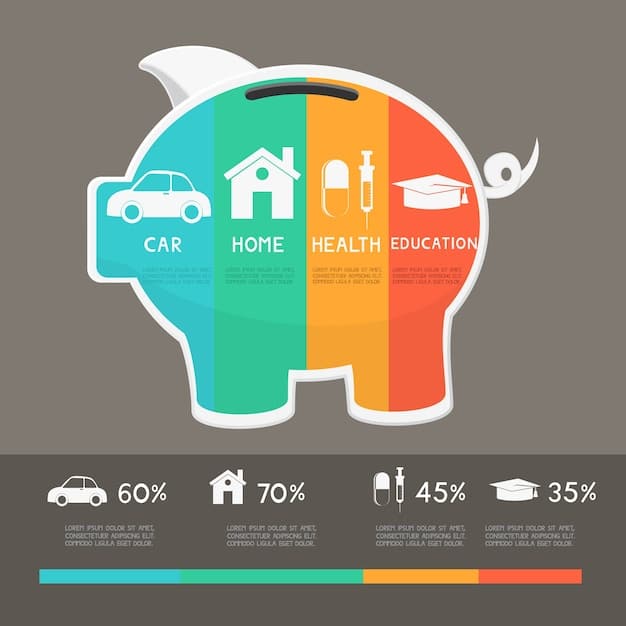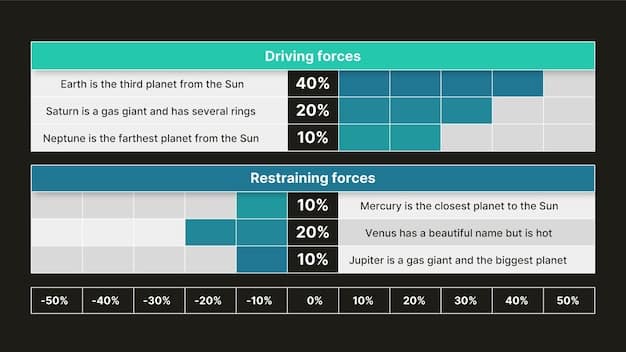Urgent: Congress Debates EV Tax Credit Extension – Will It Pass?

The US Congress is currently debating whether to extend the 8% electric vehicle (EV) tax credit, a decision that could significantly impact the affordability and adoption of EVs, along with the broader automotive industry and consumer behavior.
The future of electric vehicle affordability in the United States hangs in the balance as Congress debates extension of the 8% electric vehicle tax credit: will it pass? This decision could significantly influence the adoption rate of EVs across the nation.
Electric Vehicle Tax Credit: An Overview
The electric vehicle (EV) tax credit has been a cornerstone of US efforts to promote sustainable transportation. Designed to lower the upfront cost of purchasing an EV, this incentive aims to make these vehicles more accessible to a broader range of consumers.
Understanding the mechanics of the tax credit is crucial to grasping its potential impact on the EV market.

How the EV Tax Credit Works
The EV tax credit, officially known as the Clean Vehicle Credit, provides a tax incentive to individuals and businesses that purchase eligible new EVs. Here’s a breakdown of how it typically works:
- Eligibility: The credit is generally available for new EVs that meet certain criteria, including battery capacity, vehicle weight, and assembly location.
- Credit Amount: Previously, the maximum credit was $7,500, depending on the vehicle’s battery capacity and other factors. The current debate centers around extending the 8% tax credit and determining its maximum value.
- Claiming the Credit: Buyers claim the credit when filing their federal income tax return. They must complete IRS Form 8936, Clean Vehicle Credits, and submit it with their tax return.
The primary goal of the EV tax credit is to reduce the total cost of owning an EV and to encourage more Americans to switch to electric vehicles.
The Current Debate in Congress
The debate in Congress regarding the extension of the 8% EV tax credit is multifaceted, with arguments both for and against the measure. Understanding these perspectives is crucial to assessing the likelihood of the extension passing.
Lawmakers are weighing the potential benefits and drawbacks of continuing the credit, considering its impact on various stakeholders.
Arguments for Extending the EV Tax Credit
Proponents of extending the EV tax credit emphasize its role in accelerating the adoption of electric vehicles and supporting the growth of the EV industry.
- Environmental Benefits: EVs produce zero tailpipe emissions, contributing to cleaner air and reducing greenhouse gas emissions. Extending the tax credit would incentivize more consumers to switch to EVs, further reducing emissions.
- Economic Growth: The EV industry is a rapidly growing sector, creating jobs in manufacturing, research and development, and related industries. The tax credit supports the growth of these industries and helps the US maintain a competitive edge in the global EV market.
- Consumer Affordability: EVs tend to have higher upfront costs than gasoline-powered vehicles, even though they typically offer lower operating costs over the long term. The tax credit helps to offset this initial cost barrier, making EVs more accessible to a wider range of consumers.
The extension would help the United States achieve its climate goals and support a thriving EV industry.
Potential Economic Impacts
The potential economic impacts of extending or not extending the 8% EV tax credit are significant. The decision will reverberate through various sectors, influencing consumer behavior, industry investment, and government revenues.
Analyzing these multifaceted effects is key to understanding the broader consequences of Congress’s decision.

Impact on Consumer Behavior
The EV tax credit directly influences consumer behavior by reducing the upfront cost of purchasing an electric vehicle. With the tax credit, EVs become more affordable, encouraging more consumers to consider them as an alternative to gasoline-powered cars.
Without the tax credit, the sticker price of EVs remains higher, potentially deterring some consumers from making the switch. This could slow down the adoption rate of EVs and hinder efforts to promote sustainable transportation.
Consumer choices directly impact the overall demand for EVs, which in turn affects the growth and investment in the EV industry.
The Role of Lobbying and Public Opinion
Lobbying efforts by various stakeholders and public opinion play critical roles in shaping the legislative debate surrounding the EV tax credit extension. Understanding these factors is crucial to gauging the political dynamics at play.
Interest groups and public sentiment can significantly influence lawmakers’ decisions on this matter, making it essential to examine these forces.
Lobbying Efforts by Stakeholders
Automobile manufacturers, environmental groups, and consumer advocacy organizations are among the key stakeholders actively lobbying Congress regarding the EV tax credit extension. Each group has its own priorities and arguments.
- Automobile Manufacturers: Generally support the extension, citing the need to maintain consumer demand for EVs and support the industry’s transition to electric vehicles.
- Environmental Groups: Advocate for the extension, emphasizing the environmental benefits of EVs and the importance of incentivizing their adoption.
- Consumer Advocacy Organizations: Often support the extension, highlighting the potential cost savings for consumers and the accessibility of EVs.
The intensity and effectiveness of these lobbying efforts can influence the outcome of the legislative debate.
Alternative Energy Incentives Landscape
The fate of the EV tax credit extension is intertwined with the broader landscape of alternative energy incentives and policies. Understanding these connections is key to comprehending the overall approach to promoting sustainable energy and transportation solutions.
Different policies may complement or compete with the EV tax credit, shaping the context in which Congress operates.
Federal Government Policies
The federal government has implemented various policies and programs to support the development and adoption of alternative energy technologies. Some of these include:
- Renewable Energy Tax Credits: Tax credits are available for investments in renewable energy projects such as solar, wind, and geothermal power.
- Energy Efficiency Incentives: Incentives are offered for improving energy efficiency in buildings, appliances, and industrial processes.
- Research and Development Funding: The government provides funding for research and development of advanced energy technologies through grants and contracts.
These policies collectively aim to promote a transition to a cleaner, more sustainable energy economy, with the EV tax credit as one component of this broader strategy.
Predicting the Outcome: Will the Extension Pass?
Predicting the outcome of the Congressional debate regarding the EV tax credit extension is a challenging task, given the complex political dynamics and competing interests at play. However, based on current information and trends, it is possible to assess the likelihood of the extension passing.
Several factors will influence the final decision, including political considerations, economic factors, and public support.
Factors Influencing the Decision
Several factors could influence the decision of Congress to extend the EV tax credit:
- Political Climate: The political climate in Congress can significantly impact the likelihood of the extension passing. Bipartisan support is crucial for any measure to succeed in a divided Congress.
- Economic Conditions: Economic conditions can affect the willingness of lawmakers to support tax incentives for EVs. Concerns about budget deficits and government spending may lead to hesitation.
- Public Opinion: Public opinion on EVs and the role of government in promoting sustainable transportation can influence lawmakers’ decisions.
A favorable combination of these factors would increase the likelihood of the extension passing, while unfavorable conditions could lead to its failure.
| Key Point | Brief Description |
|---|---|
| ✅ EV Tax Credit | A tax incentive for purchasing eligible new EVs. |
| 💰 Economic Impact | Influences consumer behavior and automotive industry growth. |
| 🏛️ Congressional Debate | Lawmakers assess benefits/drawbacks of extending the credit. |
| 📢 Public Opinion | Influences the political climate and lawmakers’ decisions. |
Frequently Asked Questions
▼
The electric vehicle tax credit is a financial incentive offered by the government to encourage individuals and businesses to purchase new electric vehicles. This credit aims to reduce the initial cost of EVs, making them more accessible.
▼
Eligibility typically includes individuals and businesses that purchase new electric vehicles meeting specific criteria, such as battery capacity and vehicle weight. The vehicle must also be intended for use primarily in the United States.
▼
By incentivizing the adoption of EVs, the tax credit helps reduce tailpipe emissions, contributing to cleaner air in urban areas and reducing overall greenhouse gas emissions. This supports environmental sustainability efforts nationwide.
▼
The EV tax credit supports economic growth by stimulating demand for EVs, creating jobs in manufacturing, research, and related industries. It also helps the US maintain a competitive edge in the global EV market.
▼
To claim the EV tax credit, you must complete IRS Form 8936, Clean Vehicle Credits, and submit it with your federal income tax return. Ensure that you meet all eligibility criteria and have the necessary documentation.
Conclusion
The debate surrounding the extension of the 8% electric vehicle tax credit is critical for the future of EV adoption in the United States. As Congress weighs the potential economic and environmental impacts, stakeholders and consumers alike are closely watching the outcome. The decision will likely shape the trajectory of the EV market for years to come, influencing consumer behavior, industry investment, and the nation’s progress toward a sustainable transportation future.





